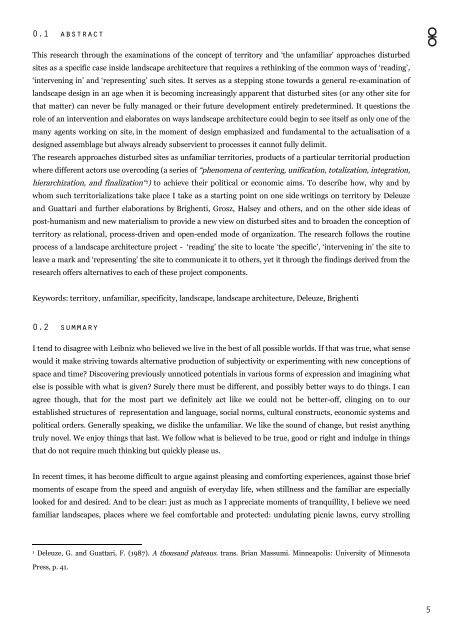Unfamiliar Territory_Research
You also want an ePaper? Increase the reach of your titles
YUMPU automatically turns print PDFs into web optimized ePapers that Google loves.
0.1 abstract<br />
This research through the examinations of the concept of territory and ‘the unfamiliar’ approaches disturbed<br />
sites as a specific case inside landscape architecture that requires a rethinking of the common ways of ‘reading’,<br />
‘intervening in’ and ‘representing’ such sites. It serves as a stepping stone towards a general re-examination of<br />
landscape design in an age when it is becoming increasingly apparent that disturbed sites (or any other site for<br />
that matter) can never be fully managed or their future development entirely predetermined. It questions the<br />
role of an intervention and elaborates on ways landscape architecture could begin to see itself as only one of the<br />
many agents working on site, in the moment of design emphasized and fundamental to the actualisation of a<br />
designed assemblage but always already subservient to processes it cannot fully delimit.<br />
The research approaches disturbed sites as unfamiliar territories, products of a particular territorial production<br />
where different actors use overcoding (a series of “phenomena of centering, unification, totalization, integration,<br />
hierarchization, and finalization“ 1 ) to achieve their political or economic aims. To describe how, why and by<br />
whom such territorializations take place I take as a starting point on one side writings on territory by Deleuze<br />
and Guattari and further elaborations by Brighenti, Grosz, Halsey and others, and on the other side ideas of<br />
post-humanism and new materialism to provide a new view on disturbed sites and to broaden the conception of<br />
territory as relational, process-driven and open-ended mode of organization. The research follows the routine<br />
process of a landscape architecture project - ‘reading’ the site to locate ‘the specific’, ‘intervening in’ the site to<br />
leave a mark and ‘representing’ the site to communicate it to others, yet it through the findings derived from the<br />
research offers alternatives to each of these project components.<br />
⚮<br />
Keywords: territory, unfamiliar, specificity, landscape, landscape architecture, Deleuze, Brighenti<br />
0.2 summary<br />
I tend to disagree with Leibniz who believed we live in the best of all possible worlds. If that was true, what sense<br />
would it make striving towards alternative production of subjectivity or experimenting with new conceptions of<br />
space and time? Discovering previously unnoticed potentials in various forms of expression and imagining what<br />
else is possible with what is given? Surely there must be different, and possibly better ways to do things. I can<br />
agree though, that for the most part we definitely act like we could not be better-off, clinging on to our<br />
established structures of representation and language, social norms, cultural constructs, economic systems and<br />
political orders. Generally speaking, we dislike the unfamiliar. We like the sound of change, but resist anything<br />
truly novel. We enjoy things that last. We follow what is believed to be true, good or right and indulge in things<br />
that do not require much thinking but quickly please us.<br />
In recent times, it has become difficult to argue against pleasing and comforting experiences, against those brief<br />
moments of escape from the speed and anguish of everyday life, when stillness and the familiar are especially<br />
looked for and desired. And to be clear: just as much as I appreciate moments of tranquillity, I believe we need<br />
familiar landscapes, places where we feel comfortable and protected: undulating picnic lawns, curvy strolling<br />
1<br />
Deleuze, G. and Guattari, F. (1987). A thousand plateaus. trans. Brian Massumi. Minneapolis: University of Minnesota<br />
Press, p. 41.<br />
5


